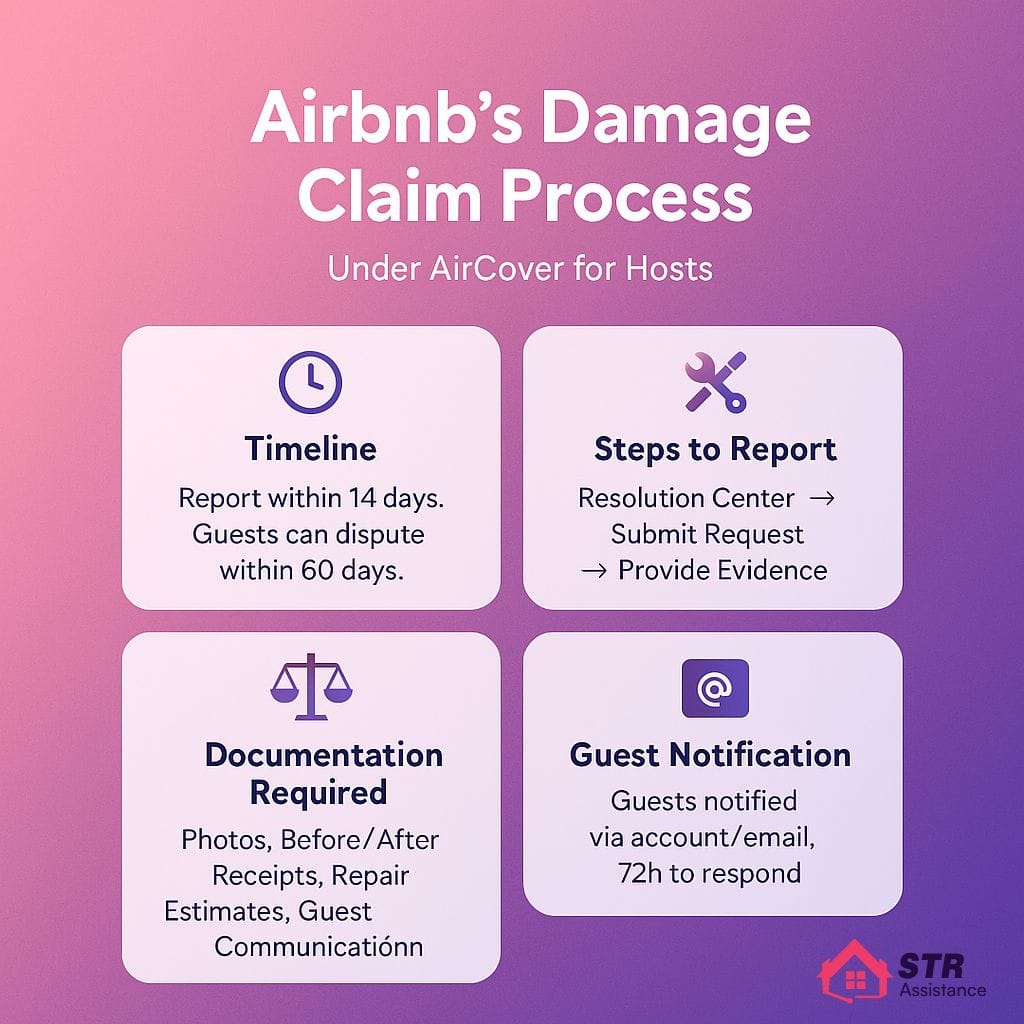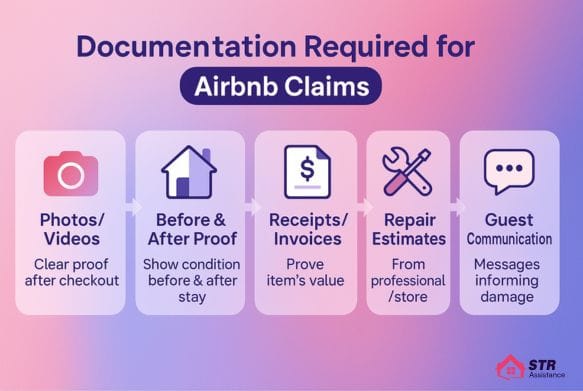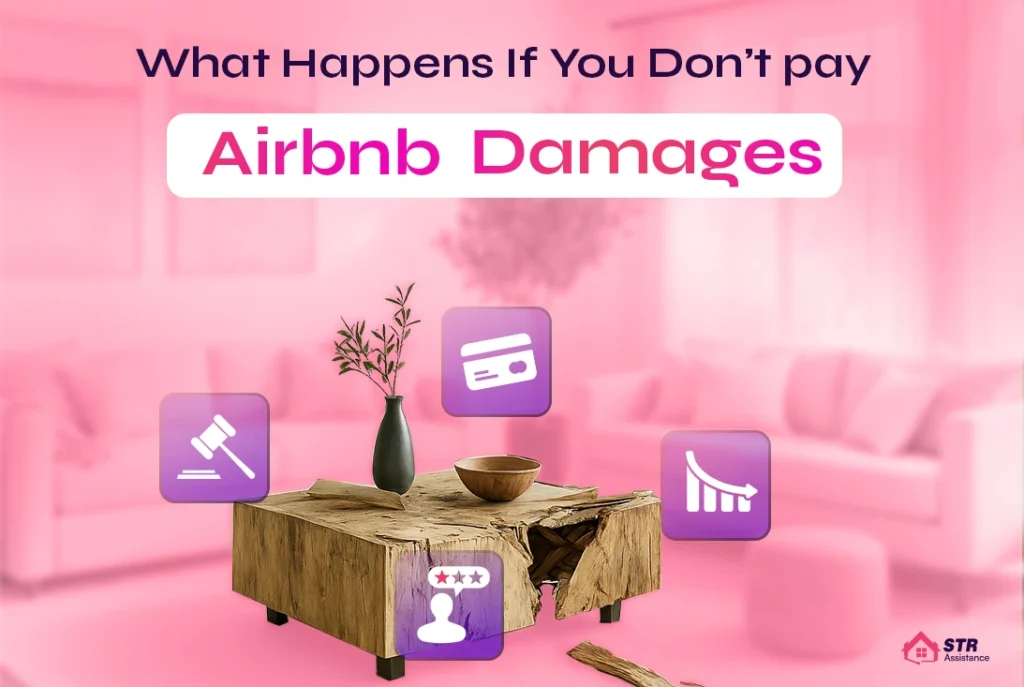If a guest causes damage and refuses to pay, the host can send a reimbursement request, involve Airbnb, have the cost charged to the guest’s credit card, or request reimbursement under AirCover for Hosts.
Here, Airbnb’s damage policy, part of AirCover for Hosts, comes to protect hosts but stay fair with guests too. Under this policy, they protect hosts from financial loss due to guest damage but require proper communication and evidence.
This is quite common when guests do not want to pay for the Airbnb damages. Maybe the guest actually causes the damage or may not. Today ,we will be talking about what happens when guests do so. Also, what should guests do to save themselves with common scenarios.
However, if you are a host facing such an issue, we are a short-term rental virtual assistant company that has worked with many Airbnb property owners as co-hosts solving their damage related issues when guests refuse to pay for damages. We guide hosts through the right steps to make sure they get the payouts they deserve.
Airbnb's Damage Claim Process

Airbnb has a systematic and fair approach to handle property damage through its Airbnb Host Damage Protection under the AirCover for Hosts program.
To file an Airbnb damage claim, hosts must report and request reimbursement through the Resolution Center within 14 days of checkout. They need to document the damage, contact the guest, and guests have 72 hours to respond. If the guest doesn’t pay or resolve the issue, the host can involve Airbnb Support.
Here is how the claim process works.
Host Reporting Process & Timeline
Hosts need to report any damages through Airbnb’s Resolution Center within 14 days of guest checkout or before the next guest checks in, whichever comes first. If the host misses this claim, then the claim can be invalidated.
Guests also have a set timeframe (60 days after checkout) to raise disputes, such as requesting refunds.
That’s why the host should inspect the property when the guest checks out to check for any damage. It’s important to document everything. This also applies to guests. The guests should do a quick inspection before leaving. That way, if any damage is reported by the host, guests will know if they caused it and can either take responsibility or confidently deny it if they didn’t.
Steps to Report:
To report the damage, here’s how the reporting works:
- Go to the Resolution Center on Airbnb.
- Submit a request for the amount hosts need to cover the damage.
- Provide evidence (photos, videos, invoices, or repair estimates).
After copying the calendar URL from Airbnb, open Google Calendar and follow these steps:
Airbnb’s Resolution Center overview
The Resolution Center is Airbnb’s official online platform for handling financial dispute-related issues between hosts and guests, such as damage claims or refunds. Simply, the Resolution Center provides a structured way to handle financial disagreements.
When a host submits a claim, the guest is notified. The guest can either accept or dispute it. Airbnb will only step in if both parties cannot agree within the Resolution Center or there’s no agreement. The Airbnb Support Team reviews the evidence and makes the final decision. It acts as a mediator for a fair resolution for both parties.
Documentation Required for Claims

When Airbnb hosts claim to be reimbursed, Airbnb does not take any action unless there are solid documents such as clear photos and videos. Airbnb can be strict about evidence. The required documents are,
- Clear photos or videos of the damage (taken immediately after checkout).
- Before-and-after proof (photos showing the condition of the item/property before the stay).
- Receipts or invoices of original items (to prove value).
- Repair or replacement estimates (from a professional or store).
- Communication with the guest (messages showing that you informed them of the damage).
Tip: Always keep receipts of furniture, appliances, or decor in a digital folder.
How guests are notified of a claim
Airbnb notifies the guests via their Airbnb account and email when hosts submit a claim in the Resolution Center. Within 72 hours guests are requested to review the claim and accept or dispute it.
What Happens If You Don’t Pay for Airbnb Damages?
If a guest doesn’t pay for damages, Airbnb will first try to charge their saved payment method. If that doesn’t work, Airbnb may suspend or ban the account and could send the debt to a collection agency. In serious cases, Airbnb or the host might take legal action. Refusing to pay for valid damages can have serious consequences. Here’s how the process works:
Airbnb Resolution Center Claim
When a host submits a damage claim through the Resolution Center, the guest is notified to accept or dispute it. If the guest doesn’t respond or disputes without valid proof, Airbnb reviews all the evidence. After a thorough review, if Airbnb finds the guest responsible for the damages, the claim will move forward.
Automatic Payment Deduction
If Airbnb finds you responsible for the damages, they can charge the payment method on your account (credit card, debit card, or PayPal), as you agreed to this under Airbnb’s Terms of Service.
Debt Recovery Through Collection Agencies
If guests remove their card information, don’t have enough funds, or intentionally avoid payment, and Airbnb can’t recover the amount, the debt may be sent to third-party collection agencies. This can negatively affect the guest’s credit score and overall financial standing.
Account Suspension or Ban
You may face account suspension or ban if you do serious damage and do not agree to pay for it.
- Temporary Suspension: Account gets suspended until the issue is resolved and you can book further.
- Permanent Ban: Repeated or serious violations can lead to permanent ban from Airbnb.
- Booking Restrictions: Flagged profiles may face limited access or host rejections.
- Linked Account Block: New accounts using the same info may be auto-blocked.
- Canceled Bookings: All future reservations are canceled with limited refund options.
- No Access: You lose access to messages, reviews, and account history.
- Group Impact: Group bookings under your name may be canceled too.
Legal Action Is Possible (Though Rare)
The legal action is rare but possible. There are cases of high-value damages that can’t be resolved through Airbnb’s normal claim process. In such situations, the host or Airbnb may involve lawyers. They may take the matter to court to recover costs. This can add extra legal fees and increase the total amount you owe.
Negative Review & Account Penalties
If you don’t pay for damages, your host may leave you a negative review. Airbnb takes reviews seriously, and a bad review can affect your chances of getting future bookings since other hosts may decline your requests. In some cases, Airbnb might even limit or suspend your account.
Your Reputation on Airbnb Will Suffer
When you get a negative review about the damage to the property or anything else, other hosts won’t believe you. Even other guests may criticize you if you are found guilty.
What Should You Do If You Break or Damage Something During Your Airbnb Stay?
When you are staying in the Airbnb unintentionally or accidently you or your family members, kids or pets can damage something. In such a situation, the best approach is to stay honest and inform the host through Airbnb messaging.
By doing so, the host may not charge you anything since you are being honest, and it gives them enough time to fix the issue before the next guest arrives. Also, the host may not involve Airbnb, and your reputation won’t be affected.
If the damage is minor, offer to pay for or replace it directly. Do not try to hide the damage. Keep communication clear and explain how it happened.
You can also document the damage yourself and check if it occurred due to normal wear and tear. In such cases, you are not responsible for it.
Always inform the host as soon as the damage happens and do not wait until checkout.
What Happens When a Host Requests Reimbursement for Damages?
If your host believes you’re responsible for damage, missing items, or unexpected cleaning costs, they can send you a reimbursement request through Airbnb’s Resolution Center. After that, you will have 24 hours to respond.
- If you pay the full amount, the request will be closed.
- But if you pay only a partial amount, decline, or don’t respond, the host can involve Airbnb.
- If there is Airbnb insurance, hosts can claim that too.
(This process doesn’t apply to stays in China, Japan, or India.)
Before sending a claim, most hosts will try to message you directly to discuss the issue. Responding politely and resolving it early can prevent the matter from going to Airbnb.
You also have the right to ask for evidence, such as photos or invoices, before agreeing to pay. Airbnb will never charge you without advance notice and gives you the chance to appeal both before and after any charges.
If you believe a charge is unfair, you have up to 60 days to appeal. If Airbnb later finds you weren’t responsible or you were overcharged, you can receive a full refund.
Common Airbnb Damage Scenarios
Here are some common Airbnb damage scenarios by which you get to know for which type of damage you get to charged for,
Common Airbnb Damage Scenarios for Which You Could Be Charged:
- Accidental damage like broken dishes, furniture scratches, or spilled drinks.
- Intentional damage or vandalism to property.
- Stains or spills on carpets, rugs, or upholstery.
- Broken electronics, décor, or appliances.
- Missing items such as towels, bedding, or kitchenware.
- Pet-related damage, like scratches or chewed furniture.
- Smoke damage or cleaning costs from indoor smoking.
- Extra cleaning due to extreme mess or rule violations.
Common Airbnb Damage Scenarios for Which Guests Won’t Be Charged:
- Normal wear and tear like faded paint or small scratches.
- Losses from unauthorized guests or parties beyond direct damage.
- Business losses or lost income for the host.
- Very high-value or collectible items that aren’t fully covered.
- Pre-existing damage from before your stay.
- Damage or loss of unsecured outdoor items like garden tools.
How Airbnb Hosts Can Protect Themselves
Hosts apply several ways to protect themselves in case any guest refuses to pay for the damage.
Using Airbnb’s AirCover for Hosts: Airbnb provides free AirCover protection for hosts, covering property damage, missing items, and extra cleaning costs.
Security Deposits and How They Work: Hosts can set a security deposit so Airbnb can charge if guests cause damage.
Writing Clear House Rules and Property Descriptions: Host should write clear rules and accurate listings in their digital guidebook to help prevent misunderstandings and reduce the risk of damage.
Tips to Avoid Damage Disputes as a Guest
If you want to avoid damage disputes as a guest, you should be prepared with some steps that you can take for Airbnb dispute management.
- To avoid conflicts and potential financial penalties, report any existing damages to the host as soon as you arrive. This way, you won’t be held responsible.
- Also, if you accidentally damage something, inform the host immediately. Then both of you can come to a solution for what you can do.
- If you stay in Airbnb frequently or travel, try to purchase travel insurance. There are many policies that cover accidental damage during your stay and can save you from unexpected expenses.
- Always follow the host’s house rules. Many damages happen when guests ignore instructions such as no smoking or no pets.
How STR Assistance Helps Airbnb Hosts with Damage Protection
Lets Talked with Us!
We help Airbnb hosts get paid for guest damage — with zero stress. STR Assistance handles everything for you.






Are you a host who experienced damage to your property or anything by your guest, but they refused to pay? Now you are contacting them, but they are not responding properly. With over 5 years of hosting experience and more than 100 damage claims successfully resolved, STR Assistance knows how to handle even the toughest situations.
We’ve faced cases where guests caused serious damage and initially refused to pay. However, our experts Airbnb VA step in to facilitate clear communication between hosts and guests. Ultimately reaching a fair resolution through our guidance.
We assist hosts through Airbnb’s damage claim process, help gather the right evidence, and ensure you receive the protection and payouts you deserve.
Here is how we help other hosts with Airbnb host damage protection and can help you too,
Proactive Damage Prevention
Check-in/Check-out Documentation
Damage Claim Assistance
Resolution Center Communication
Follow-up and Appeal Support
Conclusion
If you damage or get penalised from your host you should take it seriously. Otherwise it can affect both your reputation and your ability to book in the future.
When guests pay for damages and resolve issues quickly it builds trust with hosts and keeps their account in good standing. If you’re unsure how to handle a claim, it’s always better to communicate openly with the host and Airbnb support.
FAQs About Airbnb Damages
1. What Happens If You Damage Something During an Airbnb Experience or Hosted Service?
If you accidentally damage something during an Airbnb experience or service, the host can request payment for the damage through Airbnb’s Resolution Center. If you agree, the payment will be processed directly. If you don’t agree, Airbnb will review the evidence from both sides and decide whether you’re responsible. In some cases, Airbnb can charge your payment method if they confirm the damage was caused by you.
2. Can Airbnb charge me for damages without asking?
Yes. If Airbnb reviews the case and decides you’re responsible for the damage, they can charge your payment method, as explained in their Terms of Service.
3. What if I don’t agree with the damage claim?
You can challenge the claim by providing evidence through Airbnb’s Resolution Center. If Airbnb decides in your favor, you won’t have to pay.
4. Will Airbnb hire debt collectors if I don’t pay?
If Airbnb can’t collect the payment, they may send the case to a debt collection agency, which could affect your credit score.
5. How long does it take to sort out a damage claim?
Most cases are resolved within a few days to a week, depending on how quickly both the host and guest respond and provide evidence.

